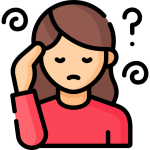Difficulty with Language Comprehension
Language comprehension skills vary a lot from one person with aphasia to another. Some people with aphasia are able to understand spoken language with little or no difficulty. Many people are able to comprehend as long as the messages are clear and simple. Some people have a severe impairment and are not able to understand verbal language.
The primary area of the brain that is responsible for language comprehension is Wernicke’s area, usually found in the left hemisphere. People who have had strokes and brain injuries impacting Wernicke’s area are likely to have difficulty with understanding language.
Difficulty with language comprehension is dependent on the types of aphasia. Every person with aphasia is different. A speech-language pathologist (SLP) can do testing to determine if there is an impairment with comprehension.
Types of Aphasia with Minimal Comprehension Impairment
In general, people with the following types of aphasia usually are able to understand spoken language with minimal impairment:
Types of Aphasia with More Severe Comprehension Impairments
In general, people with the following types of aphasia have more severe impairments with language comprehension:
Tips for with People Who Have Comprehension Impairments
If someone you know has an impairment with language comprehension, some ways you can help include:
- Speaking slowly, but at a typical volume
- Keeping sentences short and simple
- Conveying only one idea or thought per sentence
- Minimizing background noise – go to a quiet area, turn off the TV, etc.
- Using multi-modal communication, incorporating gestures, drawings, pictures, and videos to help improve comprehension
- Being patient and persistent to continue communicating
Click on the tiles below to learn more about the most common symptoms of aphasia.
Difficulty with Reading Comprehension

Difficulty with Language Comprehension

Difficulty with Written Expression

Difficulty With Spoken Language

Agrammatism

Dysprosody

Paraphasia

